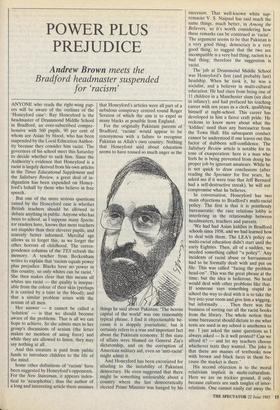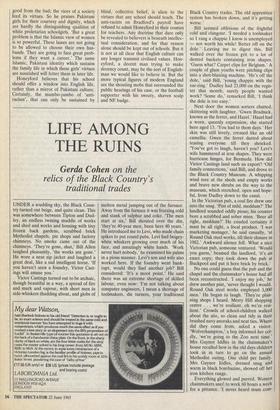POWER PLUS PREJUDICE
Andrew Brown meets the
Bradford headmaster suspended for 'racism'
ANYONE who reads the right-wing pap- ers will be aware of the outlines of the 'Honeyford case': Ray Honeyford is the headmaster of Drummond Middle School in Bradford, an over-subscribed compre- hensive with 560 pupils, 90 per cent of whom are Asian by blood, who has been suspended by the Local Education Author- ity because they consider him racist. The governors of his school meet this Saturday to decide whether to sack him. Since the Authority's evidence that Honeyford is a racist is largely derived from his own articles in the Times Educational Supplement and the Salisbury Review, a great deal of in- dignation has been expended on Honey- ford's behalf by those who believe in free speech.
But one of the more serious questions raised by the Honeyford case is whether British teachers should be allowed to debate anything in public. Anyone who has been to school, as I suppose many Specta- tor readers have, knows that most teachers are stupider than their cleverer pupils, and scarcely better informed. Merciful age allows us to forget this, as we forget the other horrors of childhood. The corres- pondence columns of the TES refresh the memory. A teacher from Beckenham writes to explain that 'racism equals power plus prejudice. Blacks have no power in this country, so only whites can be racist.' She then makes clear that this means all whites are racist — the quality is insepar- able from the colour of their skin (perhaps it is carried by a taint in the blood); and that a similar problem arises with the sexism of all men.
Her answer — it cannot be called a 'solution' — is that we should become aware of the problems. That is all we can hope to achieve. So she admits men to her group's discussions of sexism (the letter makes no mention of using force) and while they are allowed to listen, they may say nothing at all.
And this creature is paid from public funds to introduce children to the life of the mind.
Some other definitions of 'racism' have been suggested by Honeyford's opponents. For the New Statesman, it appears inden- tical to 'xenophobia'; thus the author of a long and interesting article there assumes that Honeyford's articles were all part of a nebulous conspiracy centred round Roger Scruton of which the aim is to expel as many blacks as possible from England.
For the originally Pakistani parents of Bradford, 'racism' would appear to be synonymous with a failure to recognise Pakistan as Allah's own country. Nothing that Honeyford said about education seems to have roused so much anger as the things he said about Pakistan: 'The heroin capital of the world' was one reasonably typical phrase. I find it objectionable be- cause it is sloppily journalistic, but it certainly refers to a true and important fact about the Pakistani economy. If this state of affairs were blamed on General Zia's dictatorship, and on the corruption of American military aid, even an 'anti-racist' might admit it.
And Honeyford has been excoriated for alluding to the instability of Pakistani democracy. He even suggested that there might be something undesirable about a country whert the last democratically elected Prime Minister was hanged by his successor. That well-known white sup- remacist V. S. Naipaul has said much the same things, much better, in Among the Believers, so it's worth considering how these remarks can be construed as 'racist'. The argument seems to be that Pakistan is a very good thing; democracy is a very good thing; to suggest that the two are incompatible is a very bad thing; racism is a bad thing; therefore the suggestion is racist.
The job at Drummond Middle School was Honeyford's first (and probably last) headship. When he took it, he was a socialist, and a believer in multi-cultural education. He had risen from being one of 11 children in a Manchester slum (six died in infancy); and had prefaced his teaching career with ten years as a clerk, qualifying himself at night-school. This career has developed in him a fierce craft pride. He reckons to know more about what the 'kiddies' need than any bureaucrat from the Town Hall. His subsequent conduct cannot be understood if one leaves out this factor of stubborn self-confidence. The Salisbury Review article is notable for its tone of exasperation: here is a man who feels he is being prevented from doing his proper job by ignorant amateurs. While he is not quick to draw conclusions (after reading the Spectator for five years, he asked me if it were true that Jeff Bernard had a self-destructive streak), he will not compromise what he believes.
In conversation, Honeyford has two main objections to Bradford's multi-racial policy. The first is that it is pointlessly bureaucratic: the race relations lobby is interfering in the relationship between headmasters, teachers and parents.
'We had had Asian kiddies in Bradford schools since 1958, and we had learned how to deal with them. The LEA's policy on multi-racial education didn't start until the early Eighties. Then, all of a sudden, we needed something called "a policy". Any incidents of racial abuse or harrassment had to be formally dealt with and put on file. This was called "facing the problem head-on". This was the great phrase at the time; but the idea is ludicrous. No head would deal with other problems like that. If someone says something stupid in school the way to deal with it is to take the boy into your room and give him a wigging, but informally. . . . Then there was the business of sorting out all the racist books from the library. The whole notion that some bureaucrat should dictate to me what texts are used in my school is anathema to me. I just asked the same questions as I always asked — Is it well printed? Can we afford it? — and let my teachers choose whichever texts they wanted. The joke is that there are masses of textbooks now with brown and black faces in them be- cause the market is there.'
His second objection is to the moral relativism implicit in multi-culturalism. Here we are on trickier ground, if only because cultures are such tangles of inter- relations. One cannot easily cut away the good from the bad; the vices of a society feed its virtues. So he praises Pakistani girls for their courtesy and dignity, which are hardly the distinguishing qualities of white proletarian schoolgirls. 'But a great problem is that the Islamic view of women is so powerful. These lasses are not going to be allowed to choose their own hus- bands. They are going to face great prob- lems if they want a career.' The same Islamic, Pakistani identity which sustains the family life in which these girls' virtues are nourished will fetter them in later life.
Honeyford believes that his school should offer a window into English life, rather than a mirror of Pakistani culture. Certainly, the mumbo-jumbo of 'anti- racism', that can only be sustained by blind, collective belief, is alien to the virtues that any school should teach. The anti-racists on Bradford's payroll have refused to admit Honeyford to their courses for teachers. Any doctrine that dare only be revealed to believers is beneath intellec- tual consideration, and for that reason alone should be kept out of schools. But it is not at all clear that English culture can any longer transmit civilised values. Hon- eyford, a decent man trying to make decency count, may be the sort of English- man we would like to believe in. But the more typical figures of modern England are the shouting mobs that surrounded the public hearings of his case, or the football supporter with his sweaty, shaven scalp and NF badge.















































 Previous page
Previous page